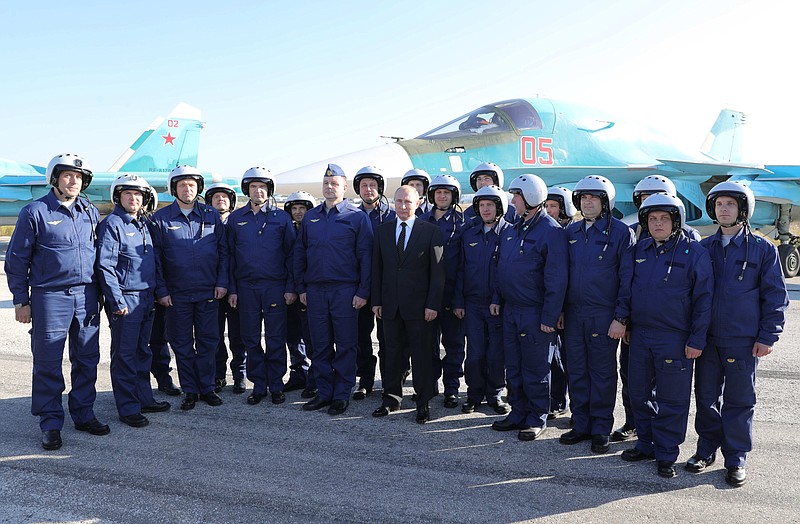CAIRO (AP) - Russian President Vladimir Putin declared "victory" in Syria during a surprise visit Monday to a military base there, then traveled to Egypt and Turkey, where he celebrated Moscow's deepening ties with those key regional powers.
The tour highlighted Russia's expanded reach in the Middle East and the global clout of its leader, who announced last week he is seeking re-election for another six-year term in March.
Speaking to Russian troops on the tarmac at the Hemeimeem air base in Syria, Putin talked of the triumph over "terrorists" and announced a partial pullout of Russian troops.
"You have shown the best qualities of a Russian soldier - courage, valor, team spirit, decisiveness and excellent skills," he said in televised remarks to the troops. "The Motherland is proud of you."
Putin praised Russia's effort to help President Bashar Assad's forces to gain the upper hand over the Islamic State group and Syrian rebels.
"Here in Syria, far away from our borders, you helped the Syrian people to preserve their state and fend off attacks by terrorists," Putin said. "You have dealt a devastating blow to those who blatantly threatened our country. We will never forget about the victims who fell in the fight against terror both here and in Russia."
Putin also said he had ordered the military to withdraw a "significant part" of the Russian contingent in Syria - although he has announced Russian troop withdrawals before.
"Friends, the Motherland is waiting for you," he said. "You are coming back home with victory!"
Gen. Sergei Surovikin, the Russian commander in Syria, said the military will pull out 23 warplanes, two helicopter gunships, special forces units, military police and field engineers. The remaining forces will be sufficient to "successfully fulfill the tasks" to stabilize the situation in Syria, he said, but did not specify how many troops and weapons would remain.
The Pentagon expressed skepticism about the statements on the withdrawal of troops and equipment from Syria. Army Col. Rob Manning, a Pentagon spokesman, said Russian statements "do not often correspond" with actual troop reductions. He said the withdrawal comments will have no impact on the U.S. and coalition fight against Islamic State extremists.
It was Putin's first trip to Syria, where Russia began its air campaign in 2015. He has hosted Assad twice in the past six years, including an unannounced Nov. 21 visit by the longtime Russian ally to the Black Sea resort of Sochi.
Putin's whirlwind trip to Syria, Egypt and Turkey came at a time when leaders in the Middle East and beyond have criticized a decision last week by U.S. President Donald Trump to recognize Jerusalem as Israel's capital, upending decades of U.S. policy.
Speaking at a news conference in Ankara, Turkey, Putin said the U.S. move "doesn't help the Mideast settlement and, just the other way round, destabilizes the already difficult situation in the region."
The decision might "finish prospects for the Palestinian-Israeli peace process," Putin said, standing next to Turkish President Recep Tayyip Erdogan.
Putin added Moscow believes the status of Jerusalem could only be settled through talks between the Palestinians and Israel in line with U.N. resolutions.
Russia's growing footprint in the Middle East extends beyond Syria and Egypt. King Salman of Saudi Arabia visited Putin in October as the two countries shook off decades of enmity and mutual suspicion.
During the Cold War, the Saudis helped arm Afghan rebels fighting the Soviet invasion. More recently, tensions ran high over Russia's military help for Assad, whom Riyadh insists must go as part of any settlement in the Syria's civil war. The Saudis have since softened their opposition to Russia's role in Syria.
Putin is hoping his trip will stoke national pride among voters in the March 18 presidential election. With his approval ratings topping 80 percent, Putin is certain to win easily, but the Kremlin has been worried about growing voter apathy.
The successful military campaign in Syria and Moscow's growing clout in the Middle East would help burnish his image as a man who restored Russia's global power and prestige after the Soviet Union's collapse in 1991.

